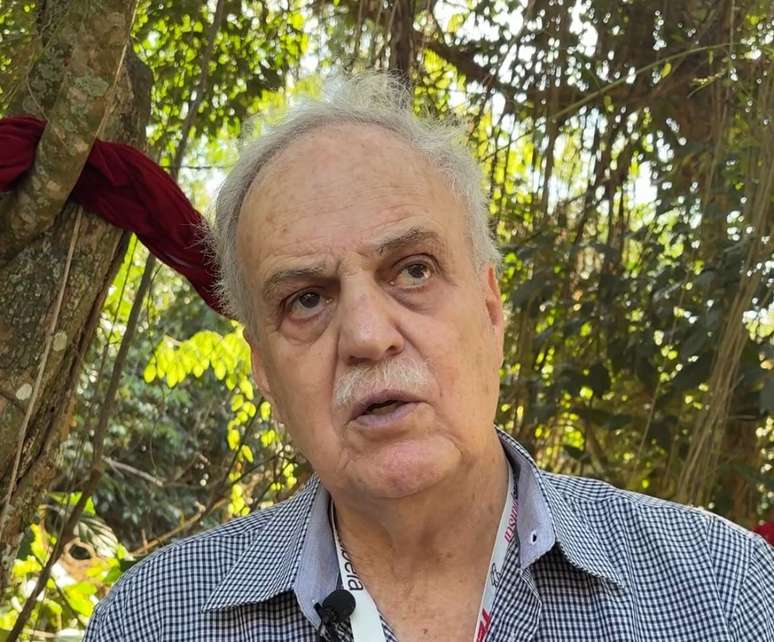Shows at Sesc Jazz, new album and four scores reveal the genius of the only Brazilian artist Radamés Gnatalli defined as a genius
Anyone who crosses paths with his uncle will know. He approaches, takes his friend by the shoulders, looks him straight in the eye and says a few words and a long-range sentence, almost always sealed with an expansive laugh. “Nothing is difficult, it just takes work”; “Life is a road that has curves with signs, curves without signs and hairpin bends with signs immediately after the curves”; “Careful, you just understood. You did not understand”; “Those who risk can make mistakes, those who do not risk are already making mistakes”. But Tio is not a prophet and his subject is not the future. “Why are you doing it, Mr. Laercio?”, I ask him, finally enjoying the role of interviewer. And he says, “Because I need to look inside people to see how they are.”
the piano of Laercio de Freitas so it is, digging into the inner years of Maria BethanyAngela Maria, Marcos Valle, Wilson Simonal, Clara Nunes, Ivan Lins, Emílio Santiago, Quarteto em Cy, Martinho da Vila, João Donato and many people to serve them with arrangements and compositions that always seem to work on two intertwined lines, surprise and excellence. Laercio is one of the biggest names in Brazilian piano, choir stylist and one of the creators of the foundations of modern instrumental music from his 1980 album São Paulo no Balanço do Choro – Ao Nosso Amigo Esmê.
CORRISTE But not only. Literate by his mother in lyrics and music at the same time, he never stopped playing. “At the age of 5, I already knew what I was born for.” At 8 he enters the conservatory. Piki Freitas, his wife for over 50 years, with whom he has daughters Thalma and Tricia, has realized that her husband, whom she calls “love” many times a day even more than 50 years after the first dance – “you go dancing the next song with me, lady, “she insinuated – she also understood that her husband’s business is making music. He is alone. “He doesn’t know how to do anything else,” she says. Seeing her mother request some home repairs for the umpteenth time, one of her daughters warned: “Mother, Dad didn’t come into the world to do these useless things. He came to make music!”
And to listen. At the age of 81, Laercio de Freitas, the uncle, will be in the audience of the Sesc Pompeia next weekend, Saturday 22nd and Sunday 23rd, to hear four pianists a night interpret his work. Modern and Eternal, conceived within an even bigger project by producer Helton Altman, will close the Sesc Jazz program in a powerful way. On Saturday, pianists Cristóvão Bastos, Carlos Roberto, Hércules Gomes and Silvia Goes play. Amilton Godoy, Carlos Roberto, Leandro Braga and Tiago Costa will perform on Sunday. This time, Laercio will be the audience. His music of complex beauty, agile bass and treacherous harmony needs a motor rhythm that the hands can no longer reach. Is it painful not to go on stage? “I prefer to listen,” he says. “Listening, I go back to my story.”
Helton was in one of his old bars, the Genial, when he started planning his project to give dignity to Laercio’s work. In addition to the exhibition, he publishes four notebooks with the scores of his most cult works, such as Ao Nosso Amigo Esmê, Vira Cambota and Sumaré-Pompeia, and an album with unpublished themes arranged by Edmilson Capelupi, Nailor Proveta and Laercio himself.
RACISM? The album will be on the platforms from 22, Saturday, and the scores can be seen at the link modoeeterno.com.br/inicio. The lyrics of the insert bring memories of the journalist Luis Nassif and of Helton himself. This is where a good pass comes in. When asked by guitarist Raphael Rabello whom he considered a genius, the demanding conductor Radamés Gnatalli replied: “Laercio de Freitas”. L
So why is Laercio no longer known? To be a black pianist in a racist country? “I never felt racism. I only cared about offering the best.” Fame was not a quest. “There are people who come into the world to make money. He doesn’t,” says Piki. When Laercio traveled for work, little Thalma stayed in her cradle every night, looking at the door, waiting for her father. Once, when she came back and opened the door, she greeted him with an irresistible smile. She hugged him and made her promise: “I don’t travel anymore. I want to see my daughters grow up.” L
+The best content in your email for free. Choose your favorite Earth Newsletter. Click here!
Source: Terra
Emily Jhon is a product and service reviewer at Gossipify, known for her honest evaluations and thorough analysis. With a background in marketing and consumer research, she offers valuable insights to readers. She has been writing for Gossipify for several years and has a degree in Marketing and Consumer Research from the University of Oxford.






